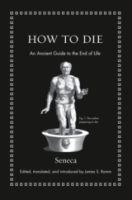
Princeton (2018) h/b 242pp £14.95 (ISBN 9780691175577)
Is death to be feared? Is it to be held off as long as possible? Is a life cut short by illness, accident or war somehow a life diminished? Are there circumstances in which it is permissible, even virtuous, to take one’s own life? These are perennial questions, and this book by R., Professor of Classics at Brad College, New York State, sets out to give the reflections on these of a thinker who was eminently qualified to address them. The reason is that he had his own health problems (he suffered from chronic respiratory illness) and was personally involved, with fatal consequences, as one who, having offended or provoked the jealousy of an absolute ruler (Nero, in this case) could be instructed to take his own life as an alternative to having it forcibly taken from him. The thinker concerned is Lucius Annaeus Seneca – Seneca the Younger (c. 4 BC – AD 65).
The structure of R.’s book is simple. After an introduction of 12 pages, he offers a translation of passages form Seneca’s prose works, including the Moral Epistles, in which ‘death looms largest’, under five broad headings: Prepare Yourself; Have no Fear; Have no Regrets; Set Yourself Free; Become a Part of the Whole.
Each of the passages has a short introduction putting it in context and, from time to time, offering a slightly more extended observation, noting for example how, as Seneca aged and his physical health deteriorated, he was not always consistent in his views on self-euthanasia (a term R. prefers to the word ‘suicide’), at one point arguing that it could be justified by a painful but temporary illness, at another that only an incurable illness would justify it, and yet again that its justification was ‘contingent on circumstances’. One never senses that R. is arguing a case or steering the readers to a particular conclusion: he is letting Seneca speak for himself.
Seneca, with his fundamentally, but not exclusively, Stoic approach, is clear that frightening tales of the afterlife are mere fables, and that if there is an afterlife (R. holds him to have no fixed ideas about an afterlife), it will be a blessed experience or some sort of absorption to be ‘part of the whole’, and that a state of non-being after death can be no worse than our non-being before birth. Seneca does not offer a rigid, systematic analysis as much as a series of observations, often with striking analogies, to support the argument that a life spent fearing death is a life largely wasted.
The translation reads easily and aims to be reader friendly, for example ‘Gaius Caesar’ is translated as ‘Caligula’, the nickname by which most readers would recognize him. Since Seneca was himself ordered by Nero to take his own life, R. includes Tacitus’ account of that drawn-out death, under the heading ‘Practice [sic] What You Preach’. R. includes the Latin texts of the extracts which form the heart of the book, presumably to allow (indeed encourage) readers with Latin to explore concepts or subtleties, which may be less apparent in translation. Short notes explain incidents, allusions and individuals mentioned in the text.
The strength of this book is that its readers are given the material to think though the weighty issues for themselves and to be reminded that the ancient world still has much to contribute to current issues.
Ray Morris
